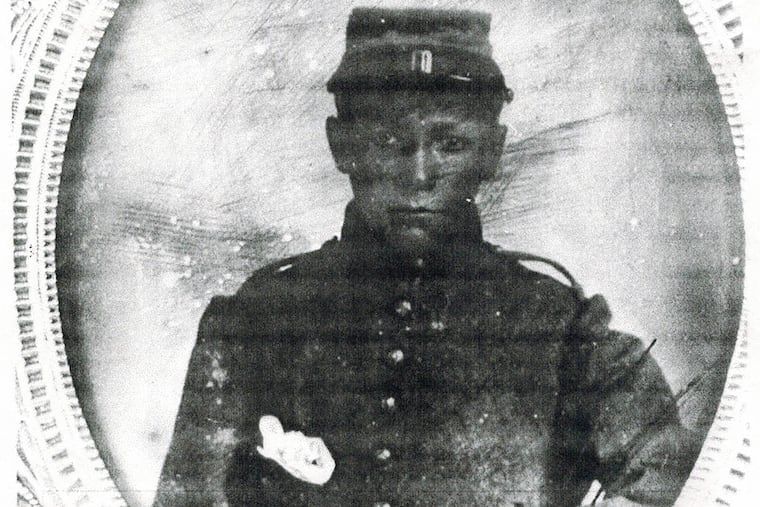From Civil War letters, a Philadelphia soldier's tale
In the late fall of 1863, Pvt. Franklin Hill of Northern Liberties was fighting his way through the Tennessee Valley with the Union Army.

In the late fall of 1863, Pvt. Franklin Hill of Northern Liberties was fighting his way through the Tennessee Valley with the Union Army.
Tattered and tested at the age of 20, Franklin had already been through hell and back.
He was wearing a dead man's pants. He was eating a pig he bought with a Confederate $20 bill he found in the same dead Rebel's pocket. And he was worried sick over his white star.
The white star was the emblem of Franklin's famed regiment - the 29th Pennsylvania Volunteers.
The 29th were soldiers' soldiers. They had fought their way through the killing grounds of Chancellorsville and Gettysburg, and through the fury of the "battle above the clouds" at Lookout Mountain. They paraded for Lincoln. They would march to the sea with Sherman. Eventually, Franklin would reenlist to war's end.
Now, he just wanted his white star. He had worn the star on his cap until he lost it. For months, he had been after his brother Charley, back in Philadelphia, to pick him up a new one. He had mailed home $10 and instructions for how Charley could find one at the jewelry and engraving shops along Second Street - and how he could fold it up in a copy of The Inquirer and mail it with three-cent stamps.
"Charley I wish you would send me that star as soon as posebel for I nead it," he wrote in exasperation.
One hundred and fifty years later, in July 2013, Aubrey Whelan knew nothing about her great-great-great-great-grandfather's role in the war when she went to Gettysburg. Aubrey, a staff writer for The Inquirer, was there to cover the battle's 150th anniversary.
Aubrey is a Civil War buff, but comes from a big family and never knew about Franklin's missing star. Or that Franklin even existed. Last Christmas, her uncle Tom McLaughlin complimented her coverage, adding: "You know we have an ancestor who was there."
Tom's mother - Aubrey's maternal grandmother - would sometimes bring the letters out when Tom was young. There were other letters, but they were scattered among other relatives.
Tom was proud to have a relative like Franklin, who was 17 when he went off to war.
"He was just a kid," Tom said.
The letters are breaking apart at the folds, but Tom was able to piece them together to make copies. On Easter, he showed up with a thick folder for Aubrey.
She opened it and there was Franklin, looking young and serious and scared in his uniform and forage cap. He could have been a kid playing dress-up.
And that night - with the 150th anniversary of the war's end approaching this Thursday - Aubrey read about her ancestor's Civil War life.
The first thing she learned was that Franklin Hill was a terrible speller. But as she pieced together the handwriting, a portrait of her ancestor emerged - as did the things that he cared about.
Like the star. And like how he promised to send home money to his "Farther and Muther" once he got his first pay, though he was happy to hear Farther got work in the "Sugher House." How he asked Charley to give his best respects to "all the boys around the corner." How he sent home Valentines for a sweetheart. How he wrote in a Philly accent:
"I am in good health at preasant and hoping that these few lines may find yous all in the same state," he wrote.
How he missed his friend, Jack Weaver, and asked him to "rite."
How in an early letter to his parents, before he knew how awful it would all be, he closed one letter on such a hopeful note. "I am still in a good hart," he wrote.
And how, later, he sounded so matter-of-fact about all the horrible stuff happening to him: how he and his fellow soldiers slept in frozen fields covered in snow, how men were dying or losing arms and legs, how they fought four battles in three nights, how they were "almost starving."
"One half of the men in our Regt. ain't got a shoe on their feet," he wrote from Tennessee. "And only the pants on that they took off the dead Rebels."
How he would close every letter with "I haven't got much more to say at the preasant."
And how very badly he wanted that two- by two-inch star. How he wanted it engraved with the name of his regiment and the battles they fought.
A lot for a star.
Tom found pension papers that tell of Franklin's Philadelphia life after the war: his marriage, the birth of his seven kids, the house where he lived on South 12th Street - just two blocks from where his great-great-great-great-granddaughter lives now - his jobs as a stationary engineer, the death of his wife and two of his children, and his own death in 1917 at the age of 74.
But in the letters, it's unclear if Franklin ever got his star. If Charley ever came through.
Franklin wasn't giving up hope.
"Rite as soon as you reseve that money," he implored his brother in the final surviving letter. "And send that star as soon as you can."
215-854-2759 @MikeNewall